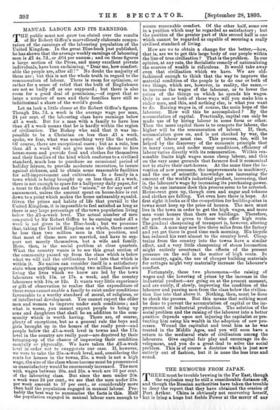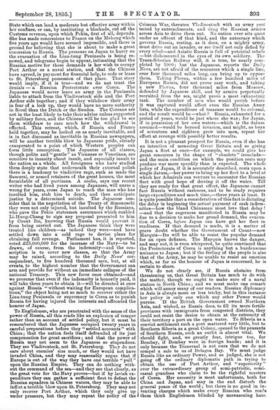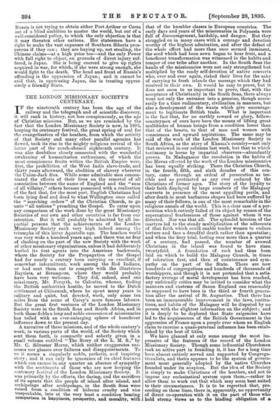THE RUMOURS FROM JAPAN.
THERE must be trouble brewing in the Far East, though the explosion may be still a considerable distance off, and though the Russian authorities have taken the trouble to deny the report that they have obtained the cession of Port Arthur. China is obviously not recovering herself, but is lying a huge but feeble Power at the mercy of any State which can land a moderate but effective army within her confines, or can, by instituting a blockade, cut off the Customs revenue, upon which Pekin, first of all, depends. She has made concessions to France on the Mekong which five years ago would have seemed impossible, and there is ground for believing that she is about to make a great concession to Russia. The pressure on Japan to hurry on the evacuation of the Liau-tung Peninsula is being re- newed, and telegrams begin to appear, intimating that the Russian motive for these demands is her wish to occupy Port Arthur as a naval station, and that the Chinese have agreed, in payment for financial help, to cede or lease to St. Petersburg possession of that place. That story would imply, if it is true—and we do not trust the denials — a Russian Protectorate over Corea. The Japanese would never leave an army in the Peninsula liable to attack from the Vladivostock side and the Port Arthur side together; and if they withdrew their army in fear of a lock up, they would have no more authority in Seoul than the Dutch or the Swedes. The Coreans are not in the least likely to take their advice unless supported by military force, and the Chinese will be too glad to see them withdraw to care much how the withdrawal is effected. This retreat, which, if Russia and France hold together, may be looked on as nearly inevitable, and is in fact discussed as inevitable in Russian newspapers, will be another terrible blow to Japanese pride, already exasperated to a point of which Western peoples can form little conception. The Japanese of all classes, though polite and " gentle" as Viennese or Venetians, are sensitive to insanity about insult, and especially insult to the nation as a whole. All foreigners who have studied them deeply state that underneath their external polish there is a tendency to vindictive rage, such as made the Samurai, or armed retainers of the great houses, the most formidable of all partisans. A coolie, says one recent writer who had lived years among Japanese, will nurse a wrong for years, cross Japan to reach the man who has insulted him, stab him to death, and then anticipate justice by a determined suicide. The Japanese con- sider that in the negotiation of the Treaty of Simonoseki they were not only injured, but insulted by the Russians, who gave the Pekin statesmen assurances which enabled Li-Hung-Chang to sign any proposal presented to him by Count Ito, knowing that Russia, would prevent it from being carried out. The Japanese think they were treated like children—as indeed they were—and have settled down into a cold rage to devise plans for obtaining full revenge. Parliament has, it is reported, voted £25,000,000 for the increase of the Navy—to be drawn, of course, from the indemnity—and the con- scription is to cover new classes, so that the Army may be raised, according to the Daily News' cor- respondent, to five hundred thousand men, but, at all events, to the highest number that the Government can arm and provide for without an immediate collapse of the national Treasury. This new force once obtained—and we presume that even if the indemnity is honestly paid, it will take three years to obtain it—will be directed at once against Russia " without waiting for European complica- tions," the object being not so much to recover either the Liau-tung Peninsula or supremacy in Corea as to punish Russia for having injured the interests and affronted the honour of Japan.
To Englishmen, who are penetrated with the sense of the power of Russia, all this reads like an explosion of temper rather than an account of settled policy, but it must be remembered that the Japanese occupied twenty years in careful preparations before they "settled accounts" with China ; that the nation feels itself defrauded of its just compensation for great sacrifices ; and that the power of Russia may not seem to the Japanese so stupendous. They see Vladivostock, not St. Petersburg. They do not care about enemies' size much, or they would not have invaded China, and they may reasonably argue that if Europe is out of the way they have one terrible " pull " upon the Russian Empire. They can do nothing with- out the command of the sea—and they see that clearly, as the great vote for the Navy proves—but if by lavish ex- penditure they can gather a sufficient fleet to defeat the Russian squadron in Chinese waters, they may be able to inflict a terrible blow upon St. Petersburg. They may not only recover Port Arthur, which they only give up under pressure, but they may repeat the policy of the Crimean War, threaten Vladivostock with an army pro: tected by entrenchments, and drag the Russian armies across Asia to drive them out. No nation ever sits quiet under an affront of that kind, and the autocracy which governs Russia, resting, as it does, on a mighty army, must drive out an invader, or see itself not only defied by every rebel—and Asiatic Russia is full of potential rebels —but dishonoured in the eyes of its own soldiery. The Trans-Siberian Railway will, it is true, be nearly com- pleted by 1900; but the Japanese, reports the Daily News, are not afraid of the resources which a single line, over four thousand miles long, can bring up to oppose them. Taking Plevna, within a few hundred miles of European Russia, did not prove easy work, and taking a new Plevna, four thousand miles from Moscow, defended by Japanese skill, and by armies perpetually recruited from the sea, might prove a most exhausting task. The number of men who would perish before it was captured would affect even the Russian Army lists, while the expenditure of treasure would be colossal, and the result would be—what ? Russia, exhausted for a period of years, would be just where she was ; for Japan, if in possession of her own waters—which is the datum assumed—would be beyond invasion, and might, as boys of seventeen and eighteen grew into men, repeat her effort at revenge with possibly better results.
It is not a, pleasant prospect for Russia, even if she has no intention of menacing Great Britain and so giving Japan a fleet at once—for example, we could give her great resources in the shape of " obsolete " ironclads- and the main condition on which the position rests may produce war more speedily than is expected. The whole policy of Japan, if it is accurately described, rests upon a single datum,—her power to bring up her fleet to a level at which her Admirals can venture to encounter the Russian fleet with good hope of driving it off the water. Till they are ready for that great effort, the Japanese cannot face Russia without rashness, and to be ready requires large expenditure and much time,—three years at least. It is quite possible that a consideration of this fact is dictating the delay in beginning the actual payment of cash indem- nities—how the bland Chinaman must love that delay ! —and that the eagerness manifested in Russia, may be due to a decision to make her grand demand, the evacua- tion of Corea, before Japan can have got her fleet in readiness. If that demand is made, it is a matter of grave doubt whether the Government of Count—now Marquis—Ito will be able to resist the popular demand for an open defiance. The Marquis knows the danger, and may not, it is even whispered, be quite convinced that the Protectorate of Corea is anything but a burdensome nuisance to Japan ; but if the feeling of the people is also that of the Army, he may be unable to resist an emotion which, as far as the honour of Japan is concerned, he is certain to share.
We do not clearly see, if Russia abstains from threatening us, that Great Britain has much to do with the matter, though we ought to make sure of a naval station in North China ; and we must make one remark which will annoy many of our readers. Russian diplomacy in Asia is always more or less tricky, but in this instance her policy is only one which any other Power would pursue. If the British Government owned Northern Asia, and wished, as Russia does, to fill its more fertile provinces with immigrants from congested districts, they could not resist the desire to obtain at the extremity of their territory a port on the open water. To Siberia as a convict settlement such a port mattered very little, but to Southern Siberia as a great Colony, opened to the peasants of Southern Russia, such an outlet is almost vital. We should fight, and, we greatly fear, intrigue too, for Bombay, if Bombay were in foreign hands ; and it is only because the Transvaal is not ours that we do not compel a sale to us of Delagoa Bay. We must judge Russia like an ordinary Power, and so judged, she is not going off the ordinary diplomatic path in trying to obtain the use of Port Arthur, and " superiority " over the extraordinary group of semi-patriotic, semi- rascal grandees who claim to be the rightful masters of Corea. Her necessity is most unfortunate, both for China and Japan, and may in the end. disturb the general peace of the world ; but there is no good in in- venting charges which make every Russian who reads them think Englishmen blinded by unreasoning hate. Russia is not trying to obtain either Port Arthur or Corea out of a blind ambition to master the world, but out of a well-considered policy, to which the only objection is that it may threaten other nations. Her statesmen have a right to make the vast expanses of Southern Siberia pros- perous if they can ; they are buying up, not stealing, the Chinese claims—at a high price too—and the only Power with full right to object, on grounds of direct injury suf- fered, is Japan. She is being coerced to give up rights acquired in war, for which, if she were strong enough, she would fight to the death. The head and front of Russia's offending is the oppression of Japan ; and it cannot be said that, in oppressing Japan, she is treating oppres- sively a friendly State.








































 Previous page
Previous page